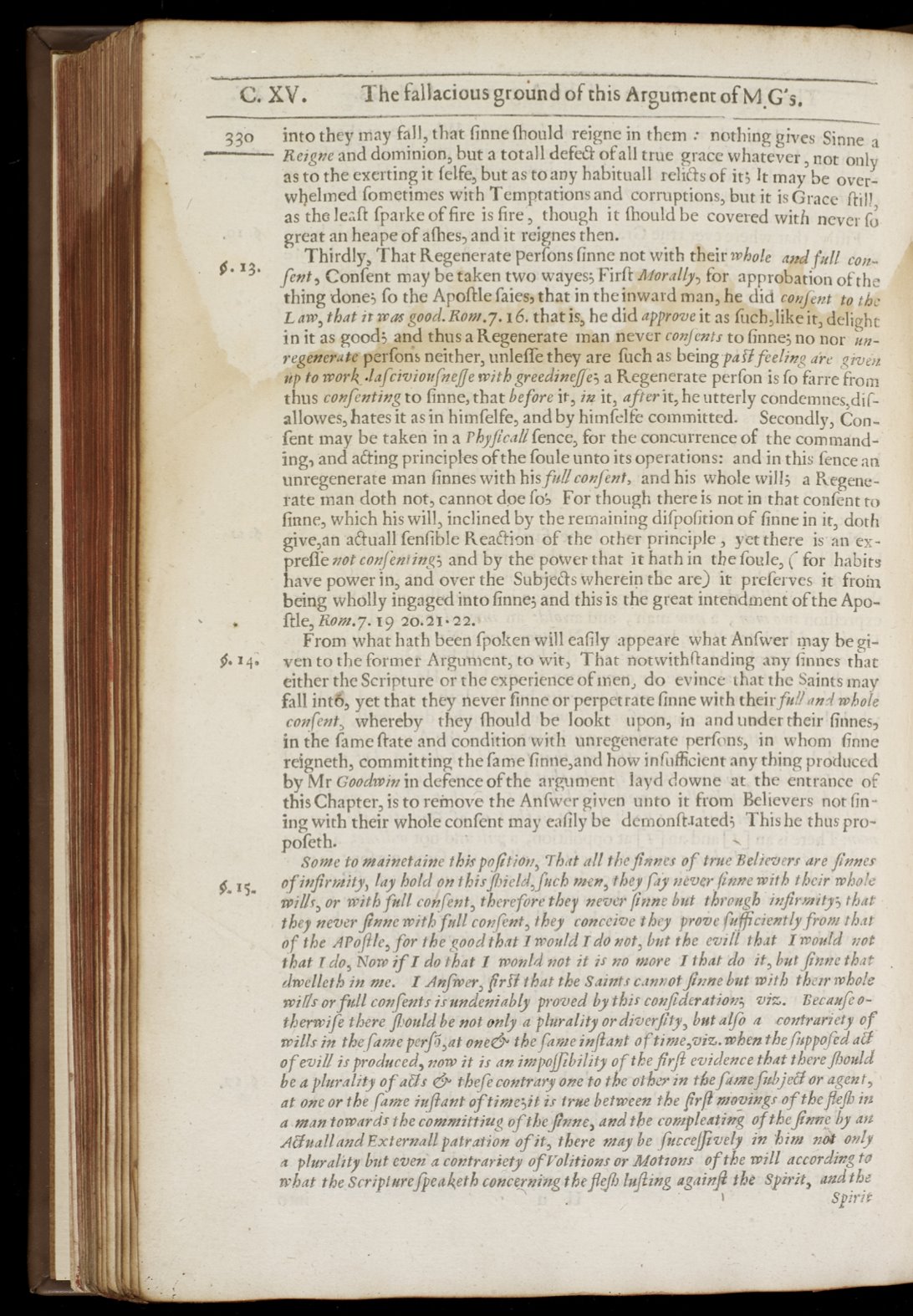

C. XV.
The
fallacious
ground of
this Argument
of
M,Gs.
33o
into
they
may
fall,
that
finnefhould
reigne
in
them
:
nothing
gives
Sinne a
Reigne
and dominion,
but
a
totali
deft&
of
all
true
grace
whatever,
not
only
as
to the
exerting
it
(elfe,
but
as
to
any
habituall
reli
&s
of
it;
It may be over
wbelmed fomettmes with Temptations and corruptions,
but
it
is
Grace
Rill,
as
the lestl fparke
of
fire
is
fire',
though
it
fhould be covered with never
fo
great
an
heape
of
afhes,
and
it
reignes
then.
A
i3
Thirdly,
That
Regenerate
perlons
finne
not
with
their
whole
and
full
con-
fent,
Confent
may
be taken
two
wayes; Firft
Morally,
for approbation
of
the
thing done;
fo
the Apoftle
faies,
that
in
the
inward man, he did
confent
to
the
Law,
that it
wan
good.
Rotn.7.
I6.
that
is,
he
did
approve
it
as
fuch,like it, delight
in
it
as
good; and thus
a
Regenerate
man
never
contents
to
finne;
no nor
un-
regenerate
perfons
neither,
unleffe
they are
fuch
as
being
"päiÏ
feeling are given
up to
work
with
greedineffe;
a
Regenerate
perfon
is
fo
farre
from
thus
contenting
to
finne,
that
before
it,
in
it, after
it,
he
utterly
condemnes,dif=
allowes, hates
it
as
in himfelfe,
and
by himfelfe
committed.
Secondly, Con
-
Pent
may
be taken
in
a
Phyficall
fence,
for the concurrence
of the
command-
ing, and
aCting
principles
of
the
foule
unto
its
operations: and
in
this
fence
an
unregenerate man
finnes
with
his
full
confent,
and
his
whole will;
a
Regene-
rate
man
doth
not,
cannot doe
fo',
For though there
is
not
in
that
confent
to
thine, which
his
will, inclined by
the remaining
difpofition
of
finne in it,
doth
give,an
a&uall fenfible
Rea
&ion
of
the other
principle
,
yet
there
is
an
ex-
preffe
not contenting;
and by the power
that
it
hath
in
the
foule,
(
for habits
have
power in, and
over the
Subje
&s
wherein
the
are)
it preferves
it
from
being wholly ingaged
into
finne;
and
this
is
the great intendment
of
the
Apo-
.
ít1e, Rom.7.
rg
20.2T 22.
From what bath
been fpoken
will eafily
appeare what
Anfwer may be gi-
ß.
14;
ven
to
the former Argument, to wit,
That
notwithflanding
any
finnes
that
either the Scripture or the
experience
of
then,
do
evince
that the
Saints may
fall
int6,
yet
that
they never
finne
or perpetrate
finne
with
their
fuUan.
whole
confent,
whereby they fhould
be lookt
upon,
in
and under their
alines,
in the
fame fïate and condition with
unregenerate
perfons,
in whom finne
reigneth,
committing the
fame
finne,and
how
infufficient
any
thing produced
by
Mr
Goodwin
in defence
of
the argument
layd downe
at the
entrance
of
this
Chapter,
is
to
remove the
Anfwer given
unto it
from
Believers
not
fin-
ingwith their
whole confent may
eafily
be demonft.tated; This
he thus
pro-
pofeth.
Some to
mainetaine this
pofition,
That
all
the
flanes
of
true
Relievers
are finnes
0.55.
of
inf
rmity,
lay
hold
on
this
fliield,fuch wen,
they
fay
never
finne
with their
whole
wills, or with
full
confent, therefore
they
never finne but through infirmity,
that
they
never
finne
with
full
confent,
they conceive
they prove
fu
ffrciently
from
that
of
the
APofile,
for
the
good
that
I
would
I
do
not, but the evil!
that
I
would
not
that
I.
do,
Now
if
I
do
that
I
would not
it
is
no more
I
that
do
it,
but
finne that
dwelleth
in
me.
I
Anfwer,
firft
that
the
Saints cannotfinite but with their
whole
wills
or
full
contents is undeniably proved
by
this
confideration;
viz.
Recaufeo-
therwifethere
jisould
be
not
only a
plurality ordiverfity, but
alp
a contrariety
of
wills in thefameperf8,at
one&
the
fame inftant
of
time,
viz.
when the
fisppofed
adt
of
evill
isproduced,
now
it
is
an
impoffibility
of
the
frrft
evidence
that
therefhould
be
a plurality
of
ads
&
there
contrary
one
to
the other
in
the
famefisbjed
or
agent,
at
one
or the
fame iuffant oftime
;it
i.r
true between
the
fr/t
movings
of
the
fief')
in
a:
man
towards thecommitting
of
the
finne, and
the
compleatisig
of
the
finale
by
an
AtluallandExternall
patration
of
it,
there
may
be
fuccevely
in him
noi"
only
a
plurality but even
a
contrariety
of
V
olitions or
Motions
of
the
will
according to
what
the scripturefpeal¿eth concerningthe
flefb Fulling
againji the Spirit, and the
spirit










